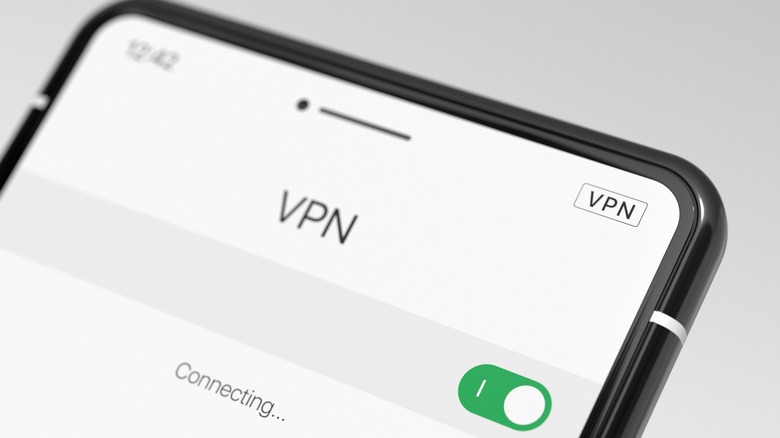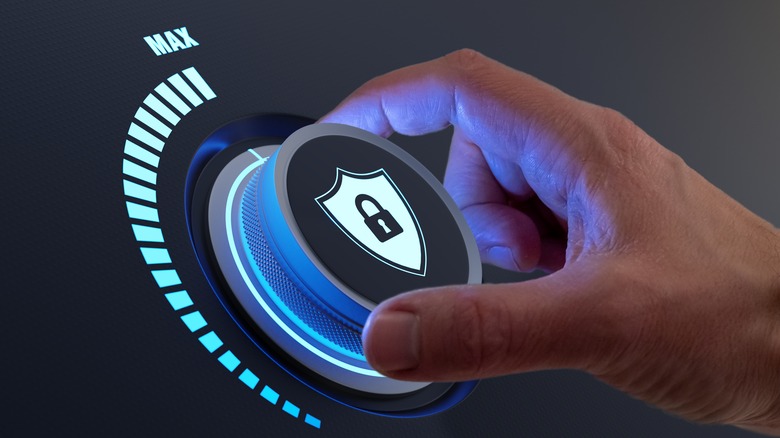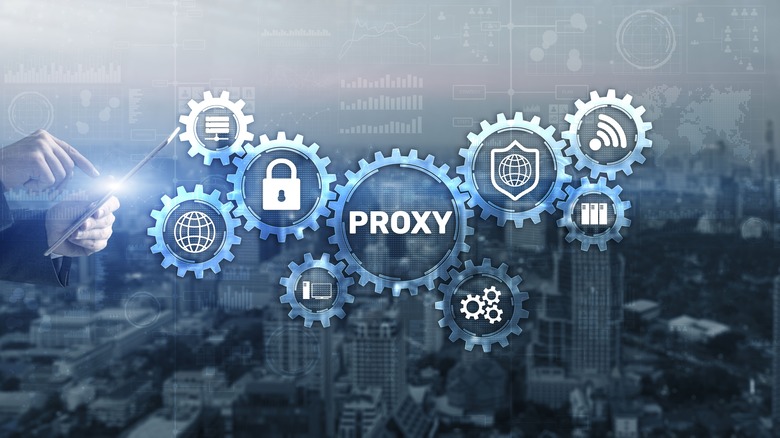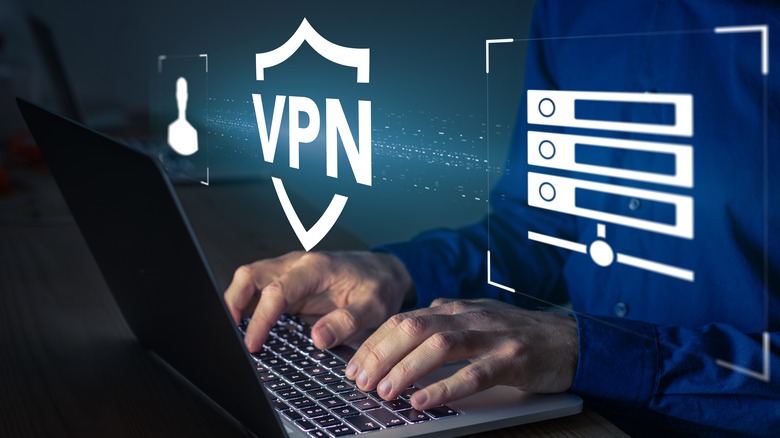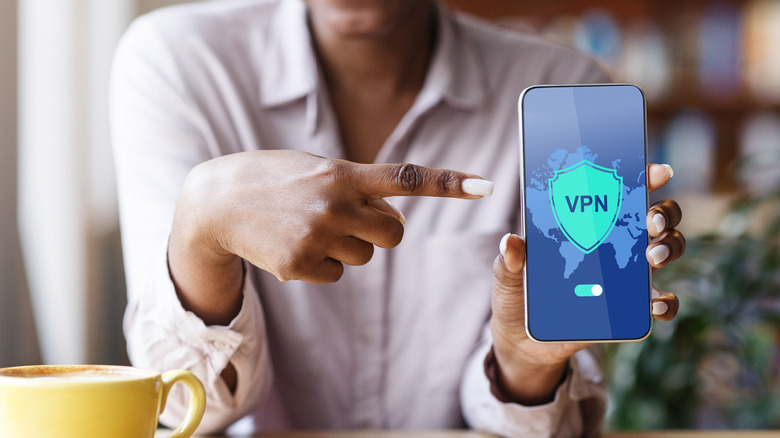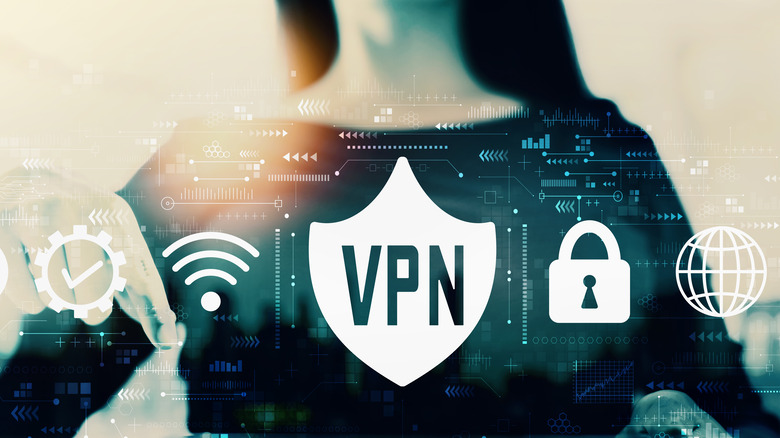What's The Difference Between A VPN And A Proxy
Contrary to popular belief, VPNs and proxies aren't the same. At the base level, both allow you to browse the web from a location you're not actually at, but besides that, they work differently on a fundamental level. However, for the vast majority of people, VPNs and proxies are used to achieve the same tasks, so it's understandable that some may think they're identical.
In a world where internet privacy and security are something most people care about, you may have heard that either VPNs or proxies are a good way to protect yourself while browsing the web — in fact, podcasts are notorious for including VPN ads. Even if privacy isn't something you're thinking about, there are a few other reasons you may find a VPN or proxy useful. In order to choose the right type of product for your needs, however, you should first understand the differences between the two and what they offer.
What is a VPN?
Let's start with the basics. A virtual private network (VPN) lets you browse the web privately and securely with a level of encryption involved between you and the VPN provider (via Security.org). VPNs are often used to sign up for services or apps that are geo-restricted to a particular location, such as changing the VPN server to a different country in order to stream its TV shows. These restrictions are usually in place because a company doesn't have the rights to stream in your country or because it simply hasn't expanded its services to your region yet. While we don't recommend doing this, it's a common scenario.
However, VPNs aren't perfect. Lots of streaming services and modern applications are able to detect VPNs and lock you out. That's because most of the popular VPN applications reuse the same list of IP addresses. So, if a streaming platform sees that a specific set of IP addresses is being used to sign in to thousands of different accounts, that may set off a red flag, as you're either a spammer trying to brute force your way into their system or a VPN application. VPNs also usually cost money to operate as they require a separate computer located elsewhere to process all of your requests, which is why you'll typically pay a few dollars per month for a VPN subscription. Of course, you could run a VPN from your home, but again, that requires a computer in some form and the resources to run it, not to mention some technical knowledge.
What is a proxy?
On the other hand, proxies are much simpler than that. Yes, they're able to hide your IP address, but not much else. Because proxies aren't encrypted, your ISP and government can potentially snoop on all of your network traffic. Likewise, sophisticated hackers would also be able to reveal your actual location. On the other hand, proxies are typically free to set up and use directly on your devices.
Proxies also offer a bit more flexibility because they can be set up within certain browsers or apps as opposed to gobbling up all of your device's network traffic. That way, your proxy can be set up to only be used on your web browser or maybe with a torrent client — although VPNs are increasingly taking over this space, as some browsers now offer similar isolated VPNs, as well. Proxies are typically free to use, but in return, many will sell your data to advertisers to recoup the cost or may engage in "suspicious behavior," according to Malwarebytes.
How do VPNs and proxies work?
A VPN acts like a middleman between you and the internet. When using one, you send your encrypted web data securely to the VPN server. From there, the VPN service relays that data to the broader web unencrypted. That way, websites won't be able to trace any web inquiries you make back to you. At a larger scale, VPNs are configured at the operating system level and capture everything that goes through your device. So, for example, if you enable a VPN on your smartphone, all of your web browsing, social media apps, games, and even app store updates are passed through the VPN.
This also means that VPNs are better for privacy and security when compared to proxies. For example, if you're visiting another country and need to access your banking apps or emails, VPNs are an ideal choice here. VPNs are typically paid in the form of a subscription; some free options do exist, though they tend to come with heavy restrictions and may not be as private as you'd like.
Proxies work in a similar way to VPNs except they don't offer any sort of encryption. This means it's much easier for websites and apps to detect that you're not actually physically located where your IP address says you are. Proxies work best for more mundane tasks like bypassing the video streaming quality restriction some wireless carriers have in place. But generally speaking, you don't want to use a proxy if you're trying to access sensitive data such as your banking apps.
What's the difference between VPNs and proxies?
Overall, a VPN's biggest strength is that it encrypts your data and takes over the entire device you're using. That means every byte of data that leaves your device is encrypted as long as the VPN is active and set up properly. On the other hand, proxies don't typically take over your entire network. This means that if you want to hide your IP address only in your browser or in something like a torrent app, you can do that while having your normal IP address visible elsewhere.
Proxies are best suited for lower priority and non-essential tasks. For example, let's say that you're trying to reach your friend who's halfway across the world but most voice apps aren't available in your friend's country. Contacting them via a normal phone can be costly due to long-distance charges. What's the solution? The friend could set up a proxy server and download something like WhatsApp, which offers free calling over VoIP. Now, going forward, you and your friend could call each other for free.
Should you use a VPN or proxy?
For the vast majority of people, using a VPN or proxy all of the time is unnecessary. However, that doesn't mean you should never use one. For VPNs, the best times to use one is when traveling, especially out of the country, on public Wi-Fi networks, or if you need to access geo-located content. This is especially true when visiting countries that may block you from accessing certain websites or content — but take note, some governments outright ban the use of VPNs or proxies. The biggest reason a person may choose to use a VPN all of the time, though, is for privacy's sake. Otherwise, unless you're a celebrity, a VPN is probably not worth the hassle.
Proxies are more of a mixed bag since they don't offer any sort of encryption, and they're probably not worth it for most people. VPNs offer better protection and work across your entire device as opposed to having to set up proxies for a small number of your apps. But whereas some see that as a negative, others see it as a positive. You might like the fact that a proxy can be isolated to one browser or app on your network. Overall, both proxies and VPNs are great choices, however, most will likely gravitate toward VPNs simply because they offer encryption.
